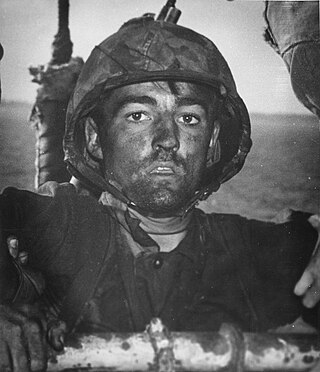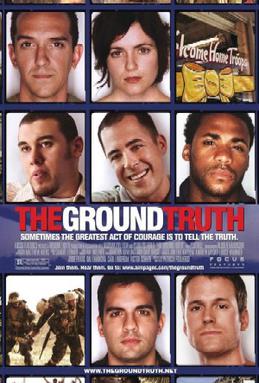Related Research Articles
Post-traumatic stress disorder (PTSD) is a mental and behavioral disorder that develops from experiencing a traumatic event, such as sexual assault, warfare, traffic collisions, child abuse, domestic violence, or other threats on a person's life or well-being. Symptoms may include disturbing thoughts, feelings, or dreams related to the events, mental or physical distress to trauma-related cues, attempts to avoid trauma-related cues, alterations in the way a person thinks and feels, and an increase in the fight-or-flight response. These symptoms last for more than a month after the event. Young children are less likely to show distress, but instead may express their memories through play. A person with PTSD is at a higher risk of suicide and intentional self-harm.

A veteran is a person who has significant experience and expertise in an occupation or field.

Combat stress reaction (CSR) is acute behavioral disorganization as a direct result of the trauma of war. Also known as "combat fatigue", "battle fatigue", or "battle neurosis", it has some overlap with the diagnosis of acute stress reaction used in civilian psychiatry. It is historically linked to shell shock and can sometimes precurse post-traumatic stress disorder.
Veterans for America is "an advocacy and humanitarian organization that works with its affiliate group, the Justice Project to engage the American public in support of policies addressing the needs of veterans, those currently in the armed services, and victims of war overseas, and to develop initiatives to make the world more secure."

The Ground Truth is a 2006 documentary film about veterans of the Iraq War. It was directed and produced by Patricia Foulkrod.
Military psychiatry covers special aspects of psychiatry and mental disorders within the military context. The aim of military psychiatry is to keep as many serving personnel as possible fit for duty and to treat those disabled by psychiatric conditions. Military psychiatry encompasses counseling individuals and families on a variety of life issues, often from the standpoint of life strategy counseling, as well as counseling for mental health issues, substance abuse prevention and substance abuse treatment; and where called for, medical treatment for biologically based mental illness, among other elements.
As defined by the United States Department of Veterans Affairs, military sexual trauma (MST) are experiences of sexual assault, or repeated threatening sexual harassment that occurred while a person was in the United States Armed Forces.

Military psychology is a specialization within psychology that applies psychological science to promote the readiness of military members, organizations, and operations. Military psychologists provide support to the military in many ways, including through direct clinical care, consultation to military commanders, teaching others and supporting military training, and through research relevant to military operations and personnel. Military psychology as a field has been growing since the early 20th century, evidence that the demands and needs for psychological clinical and operational application is continuing to grow steadily. There are many stressors associated with military service, including exposure to high-risk training and combat. As such, psychologists are critical support components that assist military leaders in designing appropriate training programs, providing oversight to those programs, and assisting military members as they navigate the challenges of military training and their new lifestyle. Military psychology covers a wide range of fields throughout the military including operational, tactical, and occupational psychology. Gender differences between military-trained personnel who seek mental health assistance have been extensively studied. Specific examples include post traumatic stress disorder (PTSD) associated with combat, or guilt and family/partner difficulties accompanying extended or frequent deployments due to separation. Clinical providers in military psychology are often focused on the treatment of stress, fatigue, and other personal readiness issues. Previous wars such as the Korean war, Vietnam war, and WW 2 provide great insight to the workings and practices of military psychology and how the practices have changed and assisted the military over the years.
Jonathan Shay is an American doctor and clinical psychiatrist. He holds a B.A. from Harvard (1963), and an M.D. (1971) and a Ph.D. (1972) from the University of Pennsylvania. He is best known for his publications comparing the experiences of Vietnam veterans with the descriptions of war and homecoming in Homer's Iliad and Odyssey.
Combat Stress is a registered charity in the United Kingdom offering therapeutic and clinical community and residential treatment to former members of the British Armed Forces who are suffering from a range of mental health conditions; including post traumatic stress disorder (PTSD). Combat Stress makes available treatment for all Veterans who are suffering with mental illness free of charge.

Shell shock is a term that originated during World War I to describe the type of post-traumatic stress disorder (PTSD) that many soldiers experienced during the war, before PTSD was officially recognized. It is a reaction to the intensity of the bombardment and fighting that produced helplessness, which could manifest as panic, fear, flight, or an inability to reason, sleep, walk, or talk.

Under the Hood Café was a coffee house located at 17 South College Street in Killeen, Texas. It provided services for soldiers located at Fort Hood, one of the largest American military installation in the world. Under the Hood Café was first managed by Cynthia Thomas, but later managers were Kyle Wesolowski, Lori Hurlebaus and Malachi Muncy. Under the Hood is a project of the Fort Hood Support Network. It billed itself as being a safe place for local soldiers to spend off-duty time at, where the normal issues of rank are irrelevant. It was also the host of the monthly Killeen Poetry Slam.
Richard C. Miller is an American clinical psychologist, author, yoga scholar and advocate of yoga as therapy.
United States v. Hasan K. Akbar was the court-martial of a United States Army soldier for a premeditated attack in the early morning hours of March 23, 2003, at Camp Pennsylvania, Kuwait, during the start of the United States invasion of Iraq.

The United States has compensated military veterans for service-related injuries since the Revolutionary War, with the current indemnity model established near the end of World War I. The Department of Veterans Affairs (VA) began to provide disability benefits for post-traumatic stress disorder (PTSD) in the 1980s after the diagnosis became part of official psychiatric nosology.
Daniel Somers was an American soldier who committed suicide in 2013. He had been suffering from various health problems, including posttraumatic stress disorder (PTSD), and left a suicide note that was later published on Gawker, after which it went viral.
The Combat Stress Intervention Program (CSIP) is a 3-year United States Department of Defense-funded research program to study mental health issues experienced by veterans returning from Operation Iraqi Freedom and Operation Enduring Freedom. The $1.5 million study, which is managed under the Military Operational Medicine Research Program, focuses on Combat Stress Disorder, Posttraumatic stress disorder, and other post-deployment transitional challenges. The study also focuses on developing resources and solutions for such veterans.
Perpetrator trauma, also known as perpetration- or participation-induced traumatic stress , both abbreviated to PITS, occurs when the symptoms of posttraumatic stress disorder (PTSD) are caused by an act or acts of killing or similar horrific violence.

United States military veteran suicide is an ongoing phenomenon regarding the high rate of suicide among U.S. military veterans in comparison to the general civilian public. A focus on preventing veteran suicide began in 1958 with the opening of the first suicide prevention center in the United States. During the mid-1990s, a paradigm shift in addressing veteran suicide occurred with the development of a national strategy which included several Congressional Resolutions. More advancements were made in 2007, when the Joshua Omvig Veterans Suicide Prevention Act created a comprehensive program including outreach at each Veterans Affairs Office (VA) and the implementation of a 24-hour crisis hotline. PTSD, depression, and combat-related guilt in veterans are often related to suicide as it can be difficult for veterans to transition to civilian life.
Operational stress injury or OSI is a non-clinical, non-medical term referring to a persistent psychological difficulty caused by traumatic experiences or prolonged high stress or fatigue during service as a military member or first responder. The term does not replace any individual diagnoses or disorders, but rather describes a category of mental health concerns linked to the particular challenges that these military members or first responders encounter in their service. There is not yet a single fixed definition. The term was first conceptualized within the Canadian Armed Forces to help foster understanding of the broader mental health challenges faced by military members who have been impacted by traumatic experiences and who face difficulty as a result. OSI encompasses a number of the diagnoses found in the Diagnostic and Statistical Manual of Mental Disorders (DSM) classification system, with the common thread being a linkage to the operational experiences of the afflicted. The term has gained traction outside of the military community as an appropriate way to describe similar challenges suffered by those whose work regularly exposes them to trauma, particularly front line emergency first responders such as but not limited to police, firefighters, paramedics, correctional officers, and emergency dispatchers. The term, at present mostly used within Canada, is increasingly significant in the development of legislation, policy, treatments and benefits in the military and first responder communities.
References
- ↑ "Bombs hit Baghdad". Scottish Daily Record & Sunday. The Free Library. 2003-10-31. Retrieved 2012-04-07.
- ↑ "Georg-Andreas Pogany Collection (AFC/2001/001/34120)". Veterans History Project. American Folklife Center, Library of Congress. Retrieved 2012-04-07.
- ↑ Arrillaga, Pauline (2010-04-18). "One-man army fights war's stresses". USA Today.
- ↑ Gettleman, Jeffrey (2003-11-06). "Soldier Accused as Coward Says He Is Guilty Only of Panic Attack". The New York Times.
- ↑ "The Dark Side Of Lariam". CBS News.
- ↑ "Hallucinations linked to drug given to troops". NBC News – Health – Mental health. 2005-02-14. Archived from the original on February 22, 2013. Retrieved 2012-08-13.
- ↑ "Speaker Biographies M to Z". The Aspen Institute. Archived from the original on 2012-09-15. Retrieved 2012-08-13.